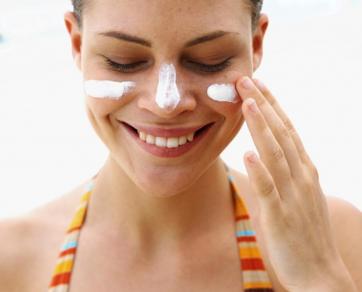 It is almost summer, which means many of you may be thinking about laying outside on the beach, by the pool, or in your backyard to soak up some sun! While being outside in the sun can help make us happier and help our bodies produce Vitamin D, sunlight can also cause a lot of damage to our skin, so much so that the most common type of cancer in the United States is skin cancer. The American Cancer Society estimates that over 73,800 people in the United States will be diagnosed with skin cancer in 2015.
It is almost summer, which means many of you may be thinking about laying outside on the beach, by the pool, or in your backyard to soak up some sun! While being outside in the sun can help make us happier and help our bodies produce Vitamin D, sunlight can also cause a lot of damage to our skin, so much so that the most common type of cancer in the United States is skin cancer. The American Cancer Society estimates that over 73,800 people in the United States will be diagnosed with skin cancer in 2015.
Sunlight travels to the Earth in both long and short waves. While long waves are harmless to humans, short waves, such as ultraviolet light, are harmful to people. Sunburns are caused when the human body is exposed to too much ultraviolet light from the sun. There are two major affects that this can have on the human body. The first is that too much exposure to these rays makes your skin thicker, leading to wrinkled, aged skin. The other affect that sunlight has is much more dangerous and severe: it can cause skin cancer.
When ultraviolet light enters the skin, it causes a disruption in the growth process of skin cells. This damage causes changes to the cells that make them grow and divide uncontrollably, leading to the growth of tumors, just like other forms of cancer. These typically appear as a small spot on your skin and can be sometimes hard to notice. The spots, however small, reach deep and invade the surrounding tissue. This can eventually cause the cancer to spread to other parts of your body, making it harder to cure.
The best way to protect your skin and help prevent skin cancer is to first limit your exposure to the sun. This includes avoiding long periods of time in the direct sunlight, choosing to sit in the shade, and wearing a hat, sunglasses, and sunscreen when you will be in the sun. Sunscreen is especially important as it can protect every inch of skin if used properly. Different sunscreens can be found in every drugstore and they come labeled in different sun protection factor (SPF) levels, from as low as 15 to as high as 75. An SPF labeling of 30, for instance, means it will take you 30 times as long to burn from the sun than if you were not wearing sunscreen at all.
Remember to be safe in the sun and protect your skin from wrinkles and disease!
Sources:
